Study Habits and College Readiness Transcript
Instructor: Jamila Thomas
Card: Educate Texas supports rigorous, college ready standards for all Texas students. The Common Instructional Framework is part of that approach.
Card: Common Instructional Framework
• Collaborative Group Work
• Writing to Learn
• Scaffolding
• Questioning
• Classroom Talk
• Literacy Groups
Card: Ready for High School: Study Habits & Life Skills.
+++ 00:00:29 +++
Jamila Thomas: You're taking your Collegiate journey and you're basically transitioning from middle school to high school.
Jamila Thomas: My name is Jamila Thomas.
Lower Third: Jamila Thomas
MAPS (Methods of Academic & Personal Success)
Cedar Hill Collegiate High School, Cedar Hill, Texas
Jamila Thomas: I teach MAPS, which stands for methods of academic and personal success, here at Cedar Hill Collegiate High School in Cedar Hill, Texas.
Jamila Thomas: Go ahead and read the board so you know what you're supposed to be doing.
Jamila Thomas: Basically, it's a transition class for our incoming freshmen, to help bridge that gap from their eighth grade year to their ninth grade year.
Jamila Thomas: So since you all have this support system, we have to make sure that we arm you with the tools that you will need.
+++ 00:01:01 +++
Jamila Thomas: So the kind of things that I teach are basically life skills and academic skills, kind of like study skills.
Jamila Thomas: All right, Nandi, go ahead and read the poem for me, please.
Jamila Thomas: Today's lesson is a follow up activity for the documentary that the students watched for the past two days in class, which was called "The Pact," about three doctors who basically overcame certain adversities and obstacles in their life.
Student: The road to success is not straight. There is a curve called failure, a loop called confusion, speed bumps called friends.
Jamila Thomas: They had a warm-up assignment, which was to read the poem on the left hand side.
+++ 00:01:36 +++
Student: Red lights called enemies, caution lights called family. You will have flats called jobs, but if you have a spare called determination...
Jamila Thomas: And I kind of wanted to jog their memory of what they had seen previously, but in a different format, a different type of way.
Student: An engine called perseverance, insurance called faith, a driver called God, you will make it to a place called success.
Jamila Thomas: The Common Instructional Framework, CIF, is a critical and crucial part of everything that I do in the classroom.
Card: Scaffolding.
+++ 00:02:02 +++
Jamila Thomas: So how does this particular poem relate to the things that you saw in this documentary?
Jamila Thomas: Scaffolding, making sure that we go over the previous day's lessons so that kids are constantly reminded of the themes, the concepts, the ideas that I wanted them to take from the lesson the previous day, because everything ultimately ties back in to each other.
Jamila Thomas: Bobby, what you got?
+++ 00:02:25 +++
Student: These three doctors were raised in the projects and they're black, so they automatically, when they were born, had statistics stacked up against them. And winning was not necessarily a logical thing for them, but they also had a goal, and they made possible possible, even when it was illogical. They knew that losing was far from optional.
Jamila Thomas: Good job, I like that answer. Who else has a really good answer for me?
Student: Things have happened in my life, with my brother being autistic and stuff like that, that they have motivated me to become something big enough for the both of us.
+++ 00:02:53 +++
Jamila Thomas: Okay. Now each one of you on your desk has a worksheet that has three boxes on it, that looks like stairs or steps. They have questions at the top. I want you to work as a group, as a collective, collaboratively, answering these questions together to come up with a consensus of the ideas that you want to put down and the experiences that you have had throughout your Collegiate experience.
Card: Classroom Talk.
Student: So people who said you couldn't, or the people that discouraged you, do you think you became a better Collegiate student because of that?
Student: Yeah.
+++ 00:03:24 +++
Student: If you say I can't do it, then I'm going to show you that I can do it.
Student: Yeah, exactly. That's how I see it.
Student: The fear of failing, that's why I sometimes procrastinate. I have overcome that.
Student: You can't use the projects as an excuse.
Student: You can't use anything as an excuse, basically.
Jamila Thomas: What did you all come up with?
Student: For the first truth, we said that anything is possible and it doesn't matter about where you're from, but where you're going.
+++ 00:03:51 +++
Jamila Thomas: I heard classroom talk and it wasn't just basic classroom talk, like, "In the documentary, I saw this. In the documentary, I saw that." They not only expressed what we saw, but then they took it to the next level and started dialoging with each other about how that particular element that they saw in the documentary relates to them.
+++ 00:04:10 +++
Jamila Thomas: Notice that you have a set of sticky notes on the side of your desk. We're going to do a little writing activity, a series of little writing activities. I want you to compose an interpretation for the overall message/central theme that the three doctors wanted to embed in their readers and viewers.
Card: Writing to Learn.
+++ 00:04:28 +++
Jamila Thomas: And explain how this quote resonates with you in regards to your journey next year. So the first quote that you have is "Step out on faith. Even if you don't know how you are going to do it, try." All right, you have one minute to write. Finish up on your sentence and then I need for you to grab the pink sticky note. Our message point deals with education. Now grab the green sticky note. All right, this particular message point deals with community. All
+++ 00:05:01 +++
right, now let's grab our last sticky note, which is the yellow sticky note. And this one is the one that's the three doctors' message points of friends and peer pressure. Notice that there are four poster boards located on the cabinets. I want you to go put your sticky notes under the appropriate category.
Jamila Thomas: The last piece that I did was the gallery walk, and that's basically where they took their mini writing to learn assignment, was the sticky notes, and place that on the poster board.
Student: All right, let's read them.
+++ 00:05:31 +++
Jamila Thomas: I want you to share out to me some things that you discovered on those sticky notes. What are some things that you saw?
Student: You should be able to give back to the freshmen that are coming in, to provide them with advice, to help them in their Collegiate experience.
Jamila Thomas: All right, what you got?
Student: I feel like everybody thinks peer pressure's a bad thing, but if you should have friends that peer pressure into doing your school work and doing what's right, you know, doing stuff that's going to help you succeed in life.
Jamila Thomas: Good job.
+++ 00:05:58 +++
Jamila Thomas: I know that it's working because I hear the dialog that the kids are having amongst themselves. I know that it's working because when I walk into other classrooms, I see them using the same techniques that they used in my class. In about three years from now, you'll see the data, you'll see the statistics and ultimately, you'll see the college acceptance letters that come with those scholarships.
Jamila Thomas: All right, have a good day. Dissecting pigs in biology.

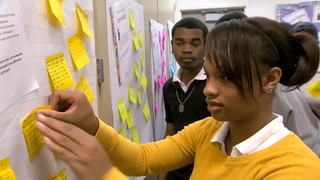
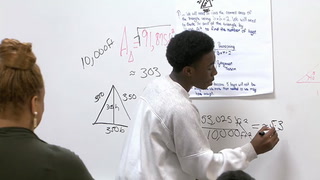
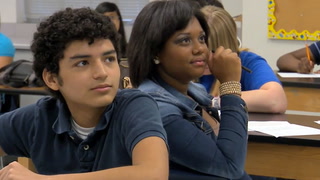
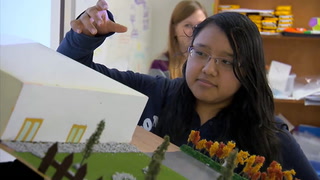
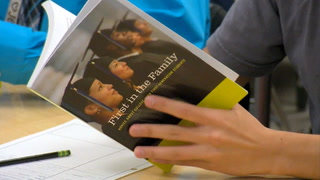
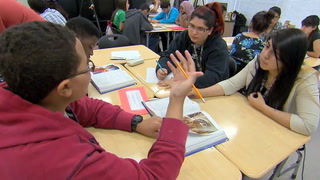








13 Comments
Elizabeth Owonikoko Jul 11, 2020 11:32pm
I think as a teacher, you are supposed to meet your students where they are to where they want to be. I believe that a teacher should help prepare the students for the future. Teachers should always make the students feel positive about themselves and their future. Making the student reflect on their experience and use that experience to be their motivating force is very powerful. I love that the students collaborated in their groups to find meaning in the poem about the three doctors. Each student gives their own opinion as the teacher goes from table to table to hear their ideas.
Gilberto Delgado Jan 10, 2017 6:32pm
Irene Chung Aug 12, 2014 10:28pm
Christine Warren Jan 11, 2014 5:52pm
Xavier Scroggins Dec 16, 2013 1:34pm